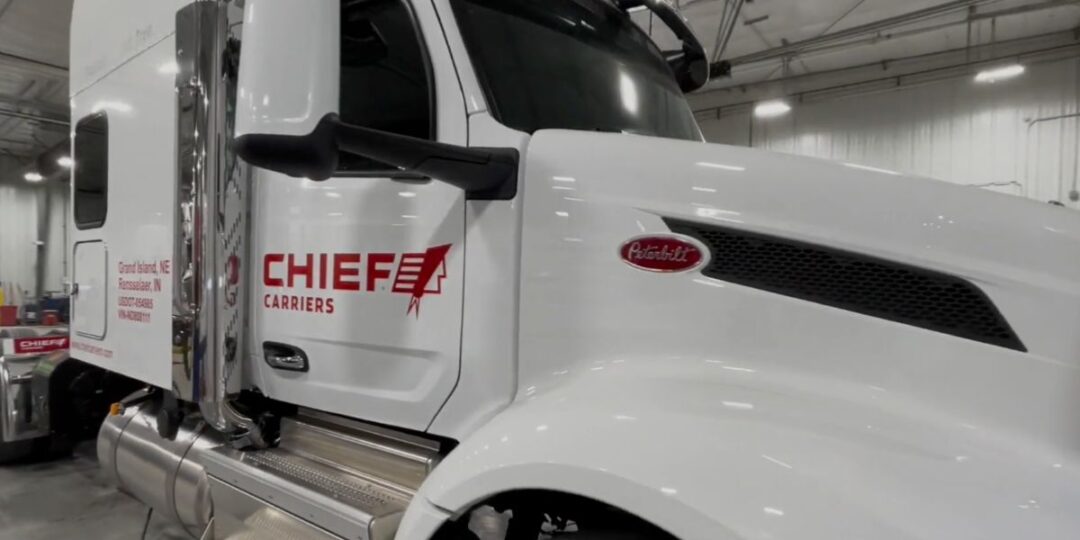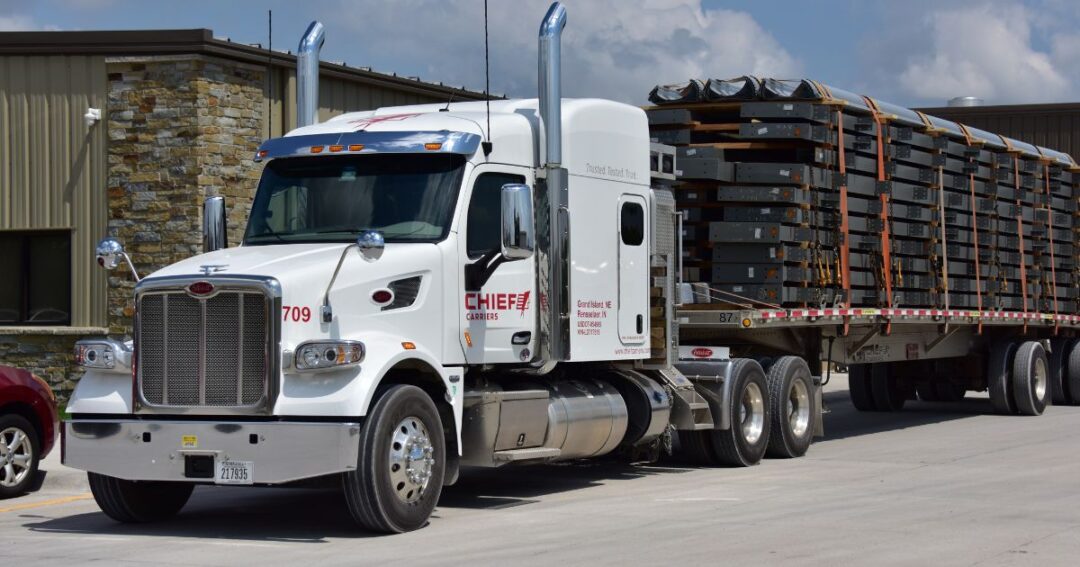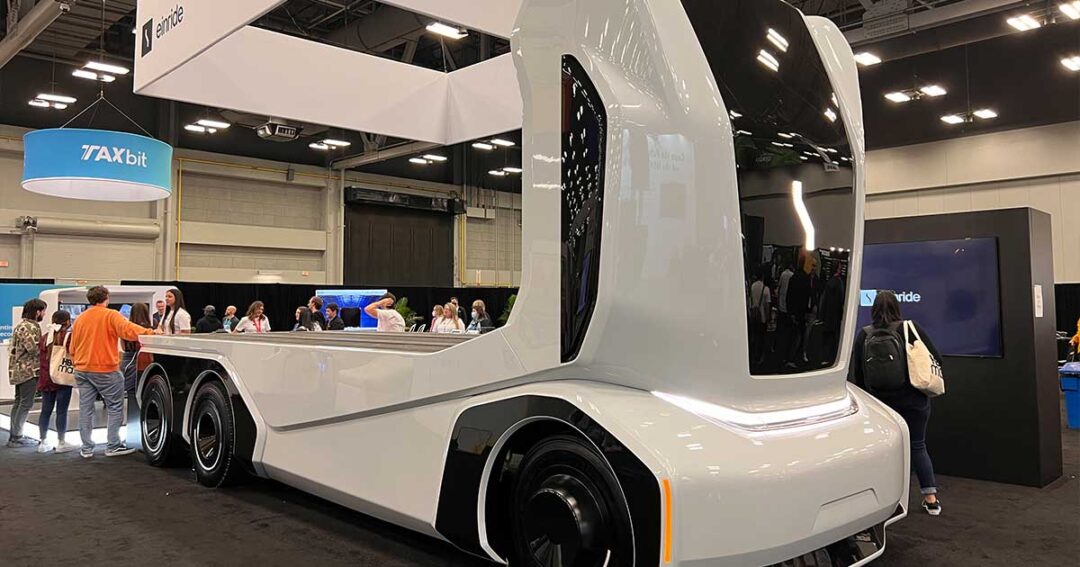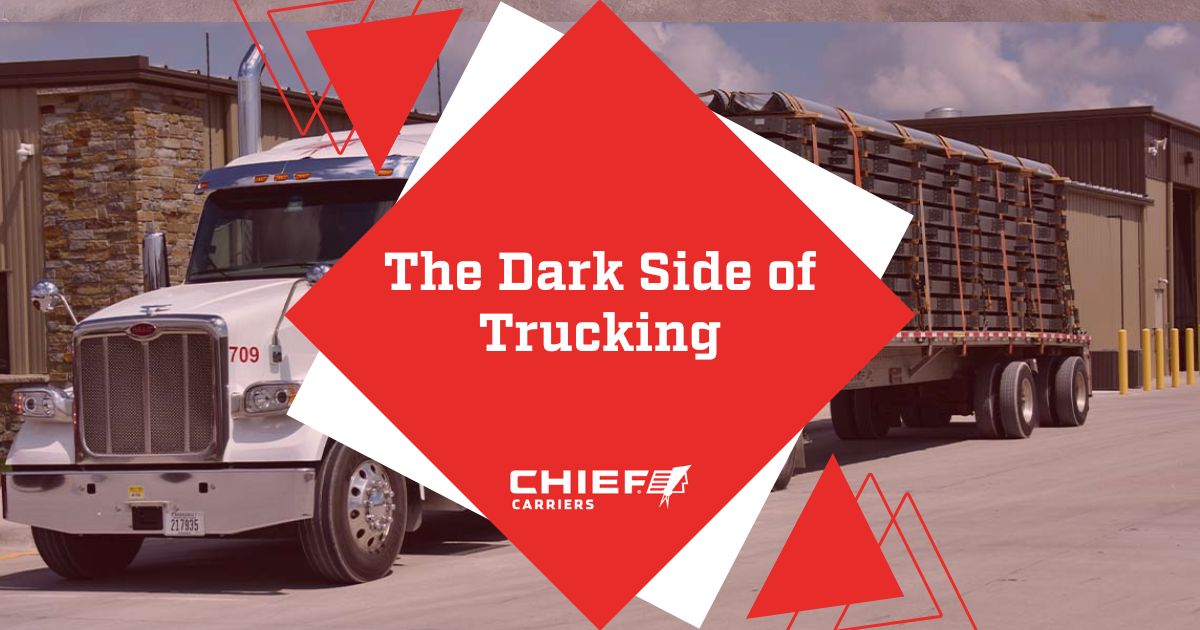Addressing the Complex Challenges of the Trucking Industry
The trucking industry plays a crucial role in the American economy by keeping goods moving across the country. It ensures a steady flow of products from coast to coast.
Yet, the industry faces challenges that could affect its operational efficiency and sustainability.
Addressing these issues is crucial for the smooth functioning of supply chains and the overall economy, but also a commitment we at Chief Carriers take seriously.
By tackling the trucking industry’s challenges, we create safer roads, fairer working conditions for drivers, and a reduced environmental footprint.
In this blog, we’ll closely examine the significant challenges the trucking industry faces, which often go unnoticed.
This is more than just pointing out problems, it’s about understanding why they happen and how they affect things, so we can come up with good solutions.

Unveiling the Challenges Within the Trucking Industry
The trucking industry, essential for business, deals with various challenges that hold back its effectiveness and expansion. Economic ups and downs, lack of drivers, and rule changes are just a few of the issues.
Concerns about the environment and the shift towards sustainability make things even more complicated.
Yet, despite these hurdles, the trucking industry shows its ability to adjust and bounce back as it keeps up with the demands of a fast-changing global market.
The Vital Role of Trucking in the Economy
Trucking serves as the backbone of the economy, enabling the seamless transport of goods nationwide. Its performance significantly influences trade, retail, and ultimately, the daily lives of millions.
An Overview of Industry-Wide Concerns
The trucking industry must tackle rising fuel costs and strict environmental regulations with creative thinking and a solid strategy to stay sustainable and effective.
How is the Trucking Industry Doing?
The trucking industry faces a critical moment, dealing with internal issues and outside pressures. Fluctuating fuel costs and a persistent lack of drivers create major obstacles.
Yet, there’s a tech transformation underway that could reshape the industry. Automation, data analysis, and sustainability progress offer new paths for efficiency and eco-friendliness.
The industry’s resilience and innovative drive show potential for change, marking a time of transition that might redefine trucking and its role in the economy.
Economic Pressures and Market Dynamics
Economic pressures are reshaping the trucking industry. Fuel volatility and driver shortages are impacting costs. Companies must adapt quickly to stay profitable and ensure timely deliveries.
Technological Advancements and Their Impact
Technology is changing the trucking industry with automation and data analysis, boosting efficiency and tackling issues like driver safety and the environment.
Is the Trucking Industry in Trouble?
The trucking industry, though tough, is dealing with significant hurdles that might make people worry about where it’s headed.
Tough economic times, like up-and-down demand and higher costs to run things, are making it hard for the industry to make money and keep going strong.
Also, new rules and regulations are making things more complicated, changing how companies follow the law and adjust to different standards.
Even with all these roadblocks, the industry’s key role in business hasn’t changed. Everyone’s working together to tackle these challenges and make sure the industry keeps thriving and growing for the long haul.
Analyzing Current Economic Struggles
The trucking industry faces economic challenges like higher fuel costs and a shortage of drivers. These issues increase expenses and make it tough for companies to keep up service levels with narrow profits.
Regulatory Changes and Their Implications
New rules are changing the trucking industry, creating challenges and chances. The focus is on safety and eco-friendliness, pushing companies to adopt new tech and methods. This could shake up the competition.

Is the Trucking Industry Slowing Down?
While the demand for freight keeps growing, showing a healthy sector, disruptions in the supply chain and global events hint at a possible slowdown in operations.
These factors create a complicated situation for an industry influenced by both the rise of e-commerce and the unpredictable nature of global challenges.
To navigate these challenges, trucking companies need to be quick on their feet and have a clear plan for the future, balancing the increasing demand with the realities of today’s global economy.
So, the question of whether the industry is slowing down isn’t simple, reflecting the various challenges and opportunities that lie ahead.
Trends in Freight Demand and Supply Chain Issues
Freight demand is soaring due to e-commerce and consumer expectations for fast delivery. Supply chain issues like port congestion and container shortages are hindering the industry’s ability to keep up efficiently.
Impact of Global Events on Trucking Operations
Global events, like pandemics and geopolitical tensions, strongly impact trucking operations. They can disrupt supply chains, change fuel prices, and shift trade patterns.
What is the biggest problem with the trucking industry right now?
The trucking industry is currently facing a big challenge: a growing shortage of drivers that could disrupt supply chains and make transportation costs go up.
This problem has a few different causes, like the workforce getting older, the job being tough, and younger workers having different expectations.
The lack of drivers doesn’t just make the supply chain less efficient but also makes people wonder if the industry can keep going in the future. To deal with this, companies and leaders in the industry are looking into new ideas to attract and keep drivers in this important sector.
Causes Behind the Growing Driver Shortage
The reasons behind the driver shortage are complicated. One factor is that older drivers don’t like being away from home for long hours, while younger people just aren’t that interested in the job. On top of that, strict regulations make it tough for new drivers to get started, which only makes the problem worse.
Efforts and Strategies to Mitigate the Shortage
To combat the driver shortage, the trucking industry is implementing various strategies, including increasing pay, offering better benefits, and improving working conditions. Companies are also investing in training programs to attract new drivers, hoping to make trucking a more appealing career choice.

What is Affecting Trucking Industry
The trucking industry faces various challenges that affect its efficiency and reliability. Safety issues and strict regulations require constant attention and adaptation.
Add to this that the environmental impact of trucking operations is coming under increased scrutiny.
These challenges not only impact the industry’s ability to function but also its reputation and long-term viability.
Addressing these issues requires a balanced approach that combines technological advancements with policy changes. This will ensure that the trucking industry can continue to play a crucial role in supporting commerce.
Navigating Through Safety Concerns and Regulations
Safety and regulations are top priorities in trucking. Companies train drivers, use vehicle tech, and follow rules to reduce risks and comply with regulations, safeguarding drivers and the public.
The Environmental Footprint of Trucking Operations
Trucking’s environmental impact, with high carbon emissions and fuel use, worries many. Efforts to cut this include cleaner fuel, more efficient vehicles, and electric trucks, showing the industry cares about the environment.
Economic Challenges Facing Truck Drivers
Truck drivers play a vital role in the transportation sector, but they encounter significant economic challenges that affect their income and job satisfaction.
Fluctuating freight rates and inconsistent salaries create financial uncertainty for drivers. These challenges not only impact individual drivers but also make it difficult for the industry to attract and retain skilled professionals.
Addressing these economic issues is crucial as the demand for goods grows. It is essential to ensure that the industry remains strong and can meet the needs of the global economy.
Fluctuating Freight Rates and Their Effects
Fluctuating freight rates create challenges for truck drivers, affecting their earnings and job stability. These changes are driven by market demand, fuel prices, and geopolitical events, causing financial uncertainty for drivers.
The Realities of Truck Driver Salaries
Truck drivers often don’t get paid enough for their hard work and long hours. Their compensation doesn’t match the importance of their job in the economy.
The Environmental Impact of Trucking
Trucking is vital for global trade but also has a big effect on the environment. It produces a lot of carbon emissions and uses a ton of fuel, putting pressure on the industry to be more eco-friendly.
Going green isn’t just about following rules; it’s crucial for reducing the industry’s impact on the environment. To make trucking sustainable in the long run, new ideas and technologies are needed to lessen the environmental effects while keeping transportation efficient.
Emissions, Fuel Consumption, and Green Initiatives
The trucking industry is a contributor to greenhouse gas emissions and fuel use, harming the environment. To combat this, green initiatives like alternative fuels and electric vehicles are being adopted to lessen the industry’s environmental impact.
Moving Towards Sustainable Trucking Solutions
Switching to sustainable trucking means using new technologies like fuel-efficient engines, electric trucks, and better routes to cut pollution and support the economy.

Will Trucking Become Obsolete? Technological Disruption in Trucking
Trucking is changing fast due to new technology.
Autonomous trucks and artificial intelligence are making logistics more efficient and safer. But, there are cybersecurity and data privacy issues to deal with.
However, finding a balance between the benefits of tech and managing risks is crucial.
To grow sustainably in trucking, we need to embrace change while keeping security and privacy in check.
The Rise of Autonomous Trucks and AI
Introducing autonomous trucks and AI in the trucking industry boosts automation and efficiency, enhancing safety, reducing errors, and optimizing logistics for a more reliable, cost-effective transportation future.
Cybersecurity and Data Privacy Concerns
Trucking now relies heavily on digital tech, raising cybersecurity concerns. Protecting info and tech from cyber threats is vital for industry trust and smooth operations in the digital age.
Safety Concerns and Accident Prevention
Safety concerns and accident prevention are top priorities in the trucking industry. Ensuring driver well-being, addressing fatigue and health issues, and improving vehicle safety play crucial roles in averting accidents and upholding road safety.
Embracing innovative strategies and strictly following safety regulations are key in reducing risks. With the industry progressing, integrating advanced safety technologies and encouraging health-conscious habits among drivers are becoming increasingly vital.
These initiatives not only help in lowering the number of accidents but also creates a safety-focused environment that benefits everyone in and around the trucking field.
Addressing Driver Fatigue and Health Issues
Driver fatigue and health issues cause many trucking accidents. Recognizing fatigue signs, providing health resources, and enforcing rest periods are crucial for preventing incidents.
Implementing Advanced Safety Features in Trucks
Truck safety is being transformed by advanced features like collision avoidance, lane departure warnings, and automatic braking. These technologies boost safety for truck operations and save lives on the road.
The Struggle for Fair Labor Practices
The trucking industry is currently in a tough fight for fair labor practices.
This battle tackles major issues like worker exploitation and driver misclassification, which directly impact wages, benefits, and working conditions.
With increased scrutiny on the industry, there’s a noticeable push towards ensuring fairness and equality for drivers.
This struggle isn’t just about bettering individual lives; it’s also about reinforcing the trucking industry’s foundation by recognizing and valuing the hardworking individuals behind its success.
Combating Labor Exploitation and Misclassification
Labor abuse and misclassification in trucking cheat drivers of fair pay and benefits, leading to an unjust work environment. It’s vital to fight these practices for a more fair industry that values and rewards drivers properly.
Unionization Efforts and Driver Advocacy
Efforts to unionize and advocate for truck drivers focus on improving labor practices. These movements empower drivers to negotiate for better pay, safer conditions, and industry respect.
Looking Ahead: The Future of the Trucking Industry
The trucking industry is at a turning point, facing both challenges and opportunities in the future. As it adapts to new technologies, environmental demands, and changing regulations, its ability to adjust will determine its success.
In the coming years, the industry will likely focus more on sustainability, digital upgrades, and creative logistics solutions. These shifts aim to boost efficiency, lessen environmental harm, and elevate safety measures.
To embrace this transformation, a collaborative effort is needed, involving all stakeholders to ensure the industry remains a crucial part of the global supply chain moving forward.
Adapting to Change: The Road Forward
Adapting to change is vital for the trucking industry to thrive and expand. Embracing new technology, adjusting to environmental rules, and meeting global market needs are crucial for staying competitive and relevant.
Encouraging Innovation and Sustainability
Encouraging innovation and sustainability is crucial for the future of trucking. Investing in electric vehicles, exploring alternative fuels, and using AI and IoT for smarter logistics are key to making the industry more efficient and aligning with environmental goals and consumer expectations.
Paving the Way for a Brighter Future in Trucking Industry
Standing at the crossroads of challenge and opportunity, the future of the trucking industry depends on our collective ability to embrace change, drive innovation, and champion fair and sustainable practices.
At Chief Carriers, we’re not just observing the trucking evolution; we’re actively shaping its future.
Through collaboration, dedication, and a shared vision for a safer, more efficient, and environmentally responsible industry, we can conquer the obstacles ahead.
Let’s work together towards a future where trucking remains the backbone of our economy, with an even stronger commitment to our people and our planet.
The road ahead is long, and the challenges are complex, but with every mile we travel, we’re paving the way for a brighter, more sustainable future in trucking.
Confronting the dark side of trucking isn’t an easy task, but it’s a necessary one.
Together, we can drive positive change for a brighter future.
Drive Change in Trucking: Join Chief Carriers Today
Confronting the challenges in the trucking industry requires courage, innovation, and dedication.
At Chief Carriers, we’re committed to leading the charge towards a more sustainable, fair, and efficient future. If you’re ready to make a difference and drive positive change, we invite you to explore a career with us.
Join a team that values your growth, contribution, and passion for making trucking better for everyone.
Learn more about our career opportunities and how you can drive change with us—your road to making a significant impact in the trucking industry starts here.

